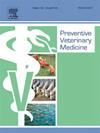An assessment of knowledge, attitudes, and practices concerning rabies among communities with a high disease risk in Timor-Leste
IF 2.4
2区 农林科学
Q1 VETERINARY SCIENCES
引用次数: 0
Abstract
Timor-Leste reported its first rabies outbreak in March 2024, making it an emerging zoonotic health threat in the country. However, there was a lack of information about community knowledge, attitudes, and practices (KAP) regarding rabies which is crucial for informing disease response plans. This study investigated the KAP regarding rabies among communities in high-risk areas for rabies incursion and spread. Between July to September 2023, 660 heads of households were interviewed using structured questionnaires in municipalities bordering Indonesian West Timor, and Dili municipality. Dog ownership by households was high (65.3 %, 431/660) and almost all households that owned dogs allowed free-roaming of dogs (98.1 %, 423/431). A small proportion of participants (2.3 %; 15/660) imported dogs from Indonesia. Around half of the participants (52.3 %, 345/660) have heard of rabies, and the majority of these participants were knowledgeable about the disease (86.7 %, 299/345). Almost one-third (30.8 %, 203/660) of households reported dog bite events and only two-thirds of households that experienced dog bites in the last 12 months (67.0 %, 132/197) reported seeking professional medical assistance. Multivariable logistic regression showed that participants with higher education and from Dili municipality were more likely to have positive attitudes towards rabies prevention. This study found limited community awareness about rabies, but positive attitudes towards rabies prevention. Healthcare-seeking behaviour was poor following dog bite events. There is a need to enhance rabies risk communication and community engagement to improve dog rabies vaccination uptake, health-seeking behavior after dog bites, and prevention of unauthorized import and in-country movement of dogs.
评估东帝汶疾病高风险社区中有关狂犬病的知识、态度和做法
东帝汶于2024年3月报告了首次狂犬病疫情,使其成为该国新出现的人畜共患病健康威胁。然而,缺乏关于狂犬病的社区知识、态度和做法(KAP)的信息,这对通报疾病应对计划至关重要。本研究调查了狂犬病入侵和传播高危地区社区的狂犬病预防措施。在2023年7月至9月期间,在与印度尼西亚西帝汶接壤的城市和帝力市使用结构化问卷对660名户主进行了访谈。家庭养狗率高(65.3% %,431/660),几乎所有养狗的家庭允许狗自由活动(98.1% %,423/431)。一小部分参与者(2.3 %;15/660)从印度尼西亚进口的狗。大约一半的参与者(52.3% %,345/660)听说过狂犬病,这些参与者中的大多数对这种疾病有所了解(86.7 %,299/345)。近三分之一(30.8% %,203/660)的家庭报告有狗咬伤事件,在过去12个月经历过狗咬伤的家庭中,只有三分之二(67.0% %,132/197)报告寻求专业医疗援助。多变量logistic回归显示,受过高等教育和来自帝力市的参与者更有可能对狂犬病预防持积极态度。这项研究发现,社区对狂犬病的认识有限,但对狂犬病预防持积极态度。在狗咬伤事件后,寻求医疗保健的行为很差。有必要加强狂犬病风险沟通和社区参与,以改善犬类狂犬病疫苗接种情况,改善犬类咬伤后的求医行为,并防止未经授权的犬类进口和在国内流动。
本文章由计算机程序翻译,如有差异,请以英文原文为准。
求助全文
约1分钟内获得全文
求助全文
来源期刊

Preventive veterinary medicine
农林科学-兽医学
CiteScore
5.60
自引率
7.70%
发文量
184
审稿时长
3 months
期刊介绍:
Preventive Veterinary Medicine is one of the leading international resources for scientific reports on animal health programs and preventive veterinary medicine. The journal follows the guidelines for standardizing and strengthening the reporting of biomedical research which are available from the CONSORT, MOOSE, PRISMA, REFLECT, STARD, and STROBE statements. The journal focuses on:
Epidemiology of health events relevant to domestic and wild animals;
Economic impacts of epidemic and endemic animal and zoonotic diseases;
Latest methods and approaches in veterinary epidemiology;
Disease and infection control or eradication measures;
The "One Health" concept and the relationships between veterinary medicine, human health, animal-production systems, and the environment;
Development of new techniques in surveillance systems and diagnosis;
Evaluation and control of diseases in animal populations.
 求助内容:
求助内容: 应助结果提醒方式:
应助结果提醒方式:


